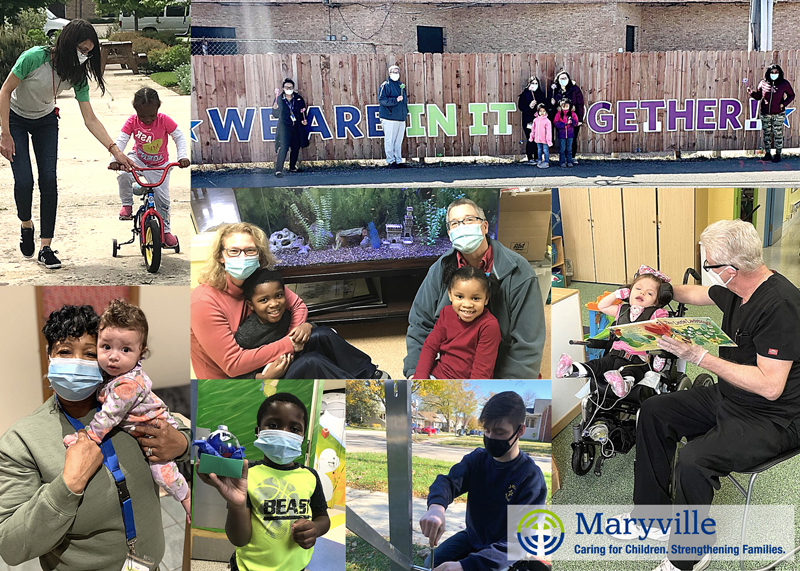By Nelia Bernabe
Manager of Social Media and Communications
Maryville, which is located just over Mount Prospect’s eastern border, was founded in 1883. It is a child care organization rooted in Catholic social teaching and dedicated to the preservation of the dignity of children at every age. Our mission is to protect children and strengthen families while helping them reach their fullest potential by empowering their intellectual, spiritual, moral and emotional growth.

Maryville serves the children and families through our life-changing programs in the following areas: behavioral health services, early childhood services, education services, family and residential services. We care for babies and young adults, ages birth to 21, across all of our programs in Bartlett, Chicago and Des Plaines.
During fiscal year 2019 Maryville served more than 8,700 children, families and adults and more than 5,000 children, families and adults in fiscal year 2020 (the decrease in number served was due to the pandemic). Maryville has about 500 staff members at its Bartlett, Chicago and Des Plaines campuses. On the Des Plaines campus, we have approximately 70 children in residence.
During the COVID-19 pandemic, serving our beautiful ministry of protecting children and families in our care was paramount. As soon as Gov. Pritzker ordered the lockdown, our Executive Director Sister Catherine M. Ryan, O.S.F. and Maryville’s leadership council moved to action swiftly. Necessary precautions were taken immediately to protect the children, families and staff.
Our Jen School Principal Anne Craig submitted its remote learning plan to the Illinois State Board of Education and received approval right away. Our Jen School faculty took up the challenge of going from in-person to remote learning. Maryville shelter, residential and health care programs continued to care for the children.
When Gov. Pritzker announced the stay-at-home order in late March of 2020, some Maryville staff in support departments did so and worked from home. Staff in family and residential homes continued to report to work daily to care for the children who are not able to be at home for a period of time.
Maryville did not have any serious outbreaks. Safety protocols such as social distancing of at least six feet from any other person, frequent hand washing, wearing of face coverings and checking of temperature at each building were strictly implemented and followed. Deep cleaning was enforced and air filtration in our homes and administrative offices was improved. Additionally, all programs were closed to outside visitors and non-essential medical appointments for our children were canceled.
To accommodate remote learning, our information technology (IT) department provided additional Chromebooks to our youth whose school buildings were closed.
In addition to providing tools for a successful remote learning experience, the children and young adults in our residential programs were engaged with different educational activities that allowed them a virtual classroom experience. For instance, the girls on our Eisenberg campus engaged in arts and crafts such as painting, decorating small tote bags with donated art materials, making a piñata, brainstorming science fair ideas, learning the history of the Ferris Wheel in Chicago while they bult popsicle stick Ferris Wheels, playing games and many more.
Maryville’s IT department made it possible for our children and youth to learn remotely and for staff to hold meetings virtually. All of our programs adapted – and warmed up – to using technology to communicate and get connected.
Maryville’s leadership team, led by Sister Cathy, sent daily communication via email to all staff. She made sure that staff had the most up-to-date information from Gov. Pritzker and Chicago Mayor Lightfoot’s offices, IDPH, CDC and other partner agencies, and what that meant for Maryville and staff. One of the first communication emails that Sister Cathy sent was announcing to staff that no one would be laid off. Sister Cathy and her leadership team had daily conference calls to discuss communication and updates to staff.
We purchased PPEs, enforced deep cleaning and improved air filtration in our group homes and administrative offices at all campuses.
Once vaccines became available, as essential workers, Maryville’s frontline workers were included in the first phase of the rollout. The majority of Maryville’s staff are vaccinated and we are working on having the youth in our care, ages 12 and older, get vaccinated.
Maryville does not foresee any long-term changes due to the pandemic but having the option of offering remote learning to students and virtual meetings to staff when needed – and knowing that they work – shows how Maryville proactively reacted and acted swiftly to address the challenges that unfolded. We strictly adhered to, implemented and followed safety protocols that protected our children and staff; allowed Maryville to operate daily; and allowed staff to keep their jobs.
Planning for the future includes consideration of what actions we would take in the event of another pandemic.